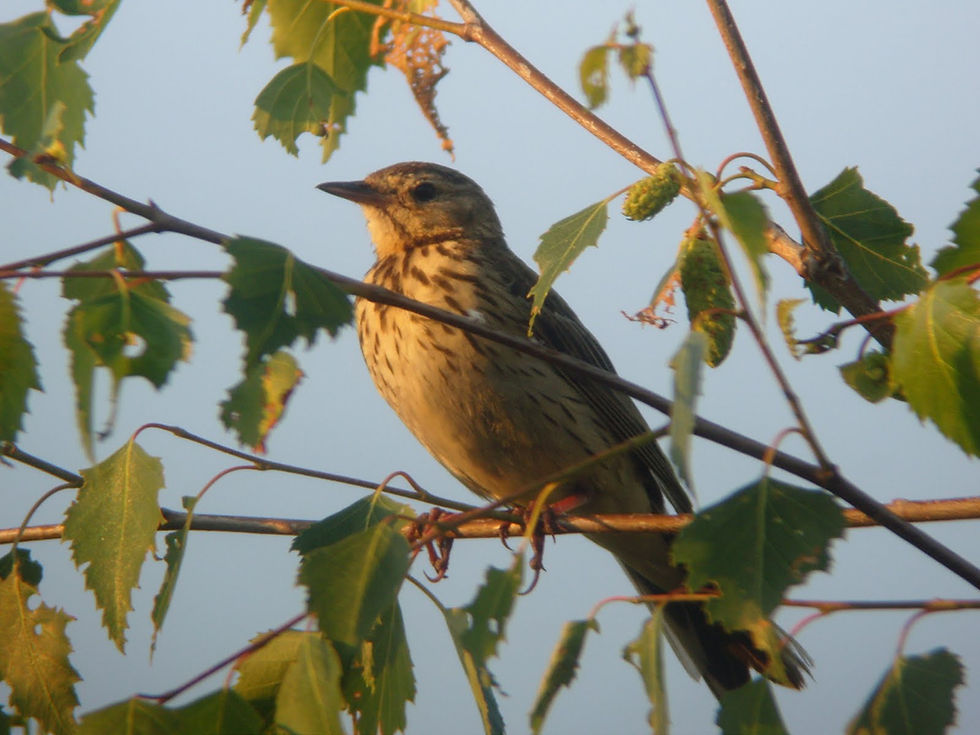
The image above is a photo of a Lark sitting on a tree branch.
"Жаворонок" (The Lark) was written by Vasily Andreyevich Zhukovsky, in the early nineteenth century. Below is the original Russian text, followed by an English translation below it.
На солнце тёмный лес зардел, В долине пар белеет тонкий, И песню раннюю запел В лазури жаворонок звонкий.
Он голосисто с вышины Поёт, на солнышке сверкая: Весна пришла к нам молодая, Я здесь пою приход весны.
Здесь так легко мне, так радушно, Так беспредельно, так воздушно; Весь божий мир здесь вижу я. И славит Бога песнь моя!
With the sun, the dark wood blushes; the soft mist pales in the valley. In the blue, the sonorous lark bursts into early song.
Full-voiced he sings from the heights as he glimmers in the sun: spring has come, young and fresh, and here I sing her arrival.
So light it is here, so welcoming, boundless and airy; from here I see all God’s great world. May it praise Him, my song!
Vasily Andreyevich Zhukovsky (Василий Андреевич Жуковский) was one of the most notable poets from the Russian Golden Age of Poetry. While the romantic poet was notable for his poems, he was most notable for his translations. He translated works such as Homer's "Odyssey" and Lord Byron's "The Prisoner of Children." Zhukovsky is also regarded as one of "Pushkin's most important precursors in forming Russian verse style and language." Born on February 9th, 1783, Vasily Zhukovsky was the illegitimate son of a rich landowner, Afanasy Ivanovich Bunin (Афанасий Иванович Бунин), and a Turkish slave girl. Zhukovsky actually received his name from his godfather, Andrei Ivanovich Zhukovsky (Андрей Иванович Жуковский). Vasily Zhukovsky grew up in the Tula province, but in 1794 moved to Moscow to continue his education in the Moscow noble university board. There, Zhukovsky discovered Nikolay Karamzin, the leader of the Romantic literary movement. From then on, Zhukovsky became a profound follower of Karamzin. This is evident in Zhukovsky's work. In addition to translating and writing poems, Zhukovsky also wrote for children.
"The Lark," (Жаворонок) was written by Zhukovsky in the early nineteenth century. It was featured as a part of a booklet that Zhukovsky produced in 1852. The booklet contained 4 poems for children, and it was dedicated to his own children. At the time, Zhukovsky had two young children, Pavel and Aleksandra. The two children were raised outside of Russia, in Karlsruhe, Germany, and Zhukovsky wanted to present them with something to read in Russian. The poem begins with descriptions of the setting, "With the sun, the dark wood blushes." In this quote, Zhukovsky personifies the dark wood to give the poem a lighter and more joyous tone. He then shifts the focus to the "sonorous lark" that "bursts into early song." Zhukovsky uses the word sonorous to describe the lark, and transition into more detail about the bird. He describes the lark as "full-voiced," and describes the bird's beauty, "glimmers in the sun." Zhukovsky then transitions the poem to the lark's perspective by displaying what the lark says in its song. The lark sings about the coming of spring and describes the atmosphere. The lark sings, "spring has come, young and fresh," and "so light it is here, so welcoming, boundless and airy." Zhukovsky uses words like "light", "young", and "airy", to maintain the light and joyous tone previously mentioned. Zhukovsky prioritizes making the tone bright so the poem can be accessible to children. Zhukovsky concludes the poem with the lark praising God, "from here I see all God's great world." He concluded the poem this way to assert his religious convictions as an effort to instill such beliefs in his children.
Overall, "The Lark" (Жаворонок) is about admiring beauty and appreciating “God's great world”. While many people are not religious, everyone is able to resonate with and admire the beauty of nature that Zhukovsky describes. Even after 170 years, Zhukovsky's work remains powerful. In the modern age, life has been taken over by technology. Daily life has become riddled with mobile devices, laptops, and smartwatches. People have become too detached from the beauty nature has to offer. They instead choose to read celebrity gossip, watch TV, or find ways to distract themselves from their own lives. It is important to look back at this poem to remember all the beauty the world has to offer.
References:
https://steemit.com/history/@tata-ovsyanik/vasily-andreyevich-zhukovsky-235-years-since-the-birth-of
コメント